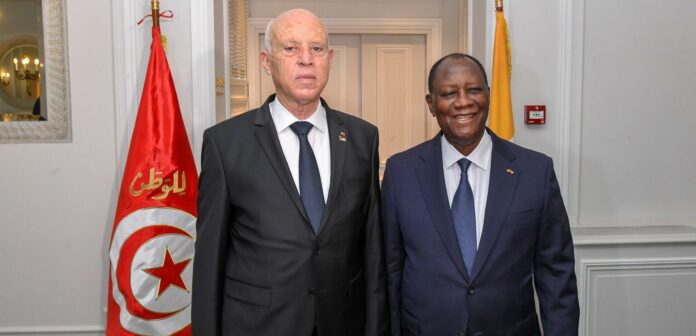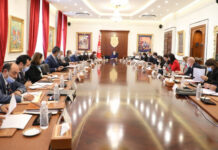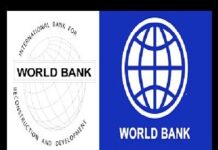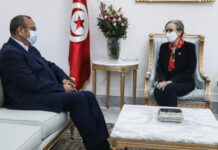May 18, 2021
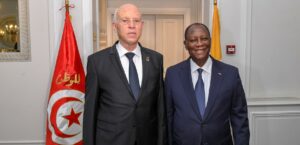
In order to attend the Summit on the financing of African economies, Qaïes Saïed traveled to Paris this weekend. Looking for a platform, he chose the hotel where Ivorian President Alassane Ouattara is staying for one of his surprising appearances.
As a reminder, Ivorian President Ouattara is serving an unconstitutional third term. He had previously authorized French military intervention in his country in 2011. The winner of the presidential election against Ouattara, Laurent Gbagbo, was sent to The Hague to be imprisoned there for a decade. Meanwhile, Ouattara continued his bloody reign with the support of France.
More recently, the Ivorian president has taken the lead in the Macronian masquerade in sub-Saharan Africa. France, which still prints the African currency, the CFA Franc, had promised to end it. But because of Ouattara’s followingism, among others, the maneuver will ultimately only further chain African countries to French neocolonialism. France will control in particular the cost of the currencies of the new African currency, as it does in Tunisia.
It’s not as if the situation is much different in Tunisia. Indeed, the Tunisian currency is printed in Switzerland or in Germany depending on the denomination. The BCT (Central Bank of Tunisia) only replaces used banknotes. This would be the only common point shared by our president, oh so pan-African, and his Ivorian counterpart. That is absolute and indisputable submission to the colonizer of yesterday.
“I Have a Dream” by Qaïes Saïed
However, President Qaïes Saïed took advantage of his visit to proclaim his speech of African brotherhood. It should be noted that Tunisia is still one of the most racist countries in Africa, as evidenced by numerous reports on the subject, as well as the law promulgated in Tunisia in February. Not that this context contrasts with Saïed’s speech. Indeed, the president promised to “train future Ivorian doctors in Tunisia”. Knowing that Tunisian universities have plummeted 1600 places in the world ranking. This goes for the best university, during the past decade, one would wonder if the Ivory Coast really wins.
Then, as if this haughty tone was not enough, Qaïes Saïed spiced up his speech with a little pan-Africanism in bad taste. Not without recalling “I have a dream” by Martin Luther King in 1963. How can we stick to the cliché of white in Africa more than that?
Still, Qaïes Saïed has a dream. His dream would be to “realize the common ambitions that Tunisia and the Ivory Coast have maintained since independence”. However, as evidenced by the Italian waste that Tunisia buys at 2 Euros per tonne. Or, as evidenced by pesticides (2,300 times more carcinogenic than the allowed limit) which Europe sells to Tunisia, while they are banned in Europe – Tunisia would only be independent in the imagination of its president.
The Tunisian President, oh so Pan-African!
Then, in the context of current events in Palestine. It would be wise to recall that Alassane Ouattara is a great friend of the Zionist entity. In July 2020, he unilaterally signed an agreement to buy warships from Israel, among others. Among the African presidents present in Paris, it would have been better seen, just out of dignity, to choose another head of state as a snack companion. One would almost wonder how his Palestinian flag pin held in place.
Nevertheless, Saïed “has a dream”, and his dream is to guarantee Tunisia’s independence. Tunisia, unfortunately, is about to be sold to the same entities to which Ouattara had ceded West Africa as a whole. And if questions remain as to which concessions the Tunisian citizen must still make, nothing is excluded.
Qaïes Saïed embellished his African dish with another visit to the President of the African Union (AU) and the Democratic Republic of Congo (DRC), Félix Tshisekedi. It should be noted that the latter has just declared a state of siege on his own territory, where he has put convicted war criminals in command in place of civilian governors. Tshisekedi has also failed to put a stop to the brewing war between Egypt, Sudan and Ethiopia. However, there can be no doubt as to the points in common between Tshisekedi and Saïed. In this case, the many futile anti-corruption speeches and dyslexia. And in order to conclude his tour of surprise visits, our President spoke with the Portuguese Prime Minister. Portugal, on the other hand, has deployed its army in two African countries, namely the Democratic Republic of the Congo and Mozambique, during the past week. Not that it matters greatly to Qaïes Saïed, oh so Pan-African!


